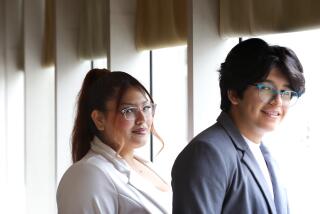Progressive School Marks Entry Into Middle Age
- Share via
The Country School, celebrating its 40th birthday this school year, is no longer in the midst of a grove of walnut trees, but in the heart of busy North Hollywood.
Originally a preschool on an estate at Victory and Cahuenga boulevards, one of the first independent schools in the San Fernando Valley, in 1951 it moved to its present location on Laurel Canyon Boulevard. There it expanded to include grades one through six.
To celebrate its survival into middle age, the school plans a birthday party next week for graduates.
School officials say the school’s approach was considered radical in 1948 when Rafe Ellis, a child therapist at the Reiss-Davis Clinic, and his wife, Laura, started it.
“Rafe put together a program based on the developmental reality of children,” said Paul Singer, the present director of the Country School. “He was way ahead of his time. He was practicing the theories of Piaget long before they became popular with educators.”
Swiss psychologist Jean Piaget taught that children develop at different rates. The Ellises and like-minded educators departed from the traditional idea that children in each grade must all learn the same things at once.
Over the years, the pupils have included the children of Sammy Davis Jr., Kenny Loggins, Ned Beatty, Bob Hope, Cybill Shepherd and other lesser-known but equally adventuresome parents.
Birthday Party
“I remember just loving it. It was like going to a friend’s birthday,” said Andrew Bass, a studio sound engineer who attended the preschool in 1949 and 1950.
He recalled that an old car was a playground fixture. The Ellises thought the early years of school are a time for children to explore their environment, not deal with academic subjects or be forced into grown-up molds.
Judge Alan Ellis of Van Nuys Municipal Court was also a Country School student in the early 1950s. He recalled “being taken seriously” by Country School teachers, he said recently.
“We are the sum of all the teachers we encounter,” he said, and Rafe Ellis (no relation) was “profoundly influential in my life.” Rafe Ellis retired in 1975 and still lives in North Hollywood.
Another influential person, Judge Ellis said, was the “rather literate Country School bus driver.” As the bus rolled from the city to the country, the driver would tell what the judge later realized were stories like James Hilton’s “Lost Horizon” and Jack London’s “White Fang.”
The Rev. Jon Dobrer, minister of the Unitarian Universalist Church of Studio City, was bused from Brentwood to attend Country School when he was 6 years old. He remembers it as a “kid-centered” place characterized by sports, crafts and field trips.
“I must represent the ultimate continuity,” he said. He has been a Country School student, swimming teacher, parent and board member.
The school has a small student-teacher ratio--classes of 22 to 24 pupils have two teachers each--and a big waiting list for the lower grades. Singer said he “could literally empty out the preschool and immediately refill it with those on the list up through 1990.”
Some grades have no waiting list, perhaps because parents do not think the academic environment is rigorous enough.
Reservations Voiced
Sue Dresher, who is both the parent of a Country School student and a public high school counselor, said she “loves the preschool and the first couple of grades, but after that there is a little too much emphasis” on the non-academic for her taste.
“I would not teach at Country School,” she said. “As an educator, I would resent any parent walking in and out of the classroom whenever they want and talking to me when the reason I am there is for the kids.”
Country School alumnus and first-grade parent Andy Bass affectionately described the school’s ambiance, saying: “You’re always welcome to walk into a classroom and sit down. They’re not hiding anything.”
On the other hand, public high school teacher and Country School parent Joanie Frekman is impressed with the school’s “very interactive and supportive” approach with parents and children.
More to Read
Sign up for Essential California
The most important California stories and recommendations in your inbox every morning.
You may occasionally receive promotional content from the Los Angeles Times.













